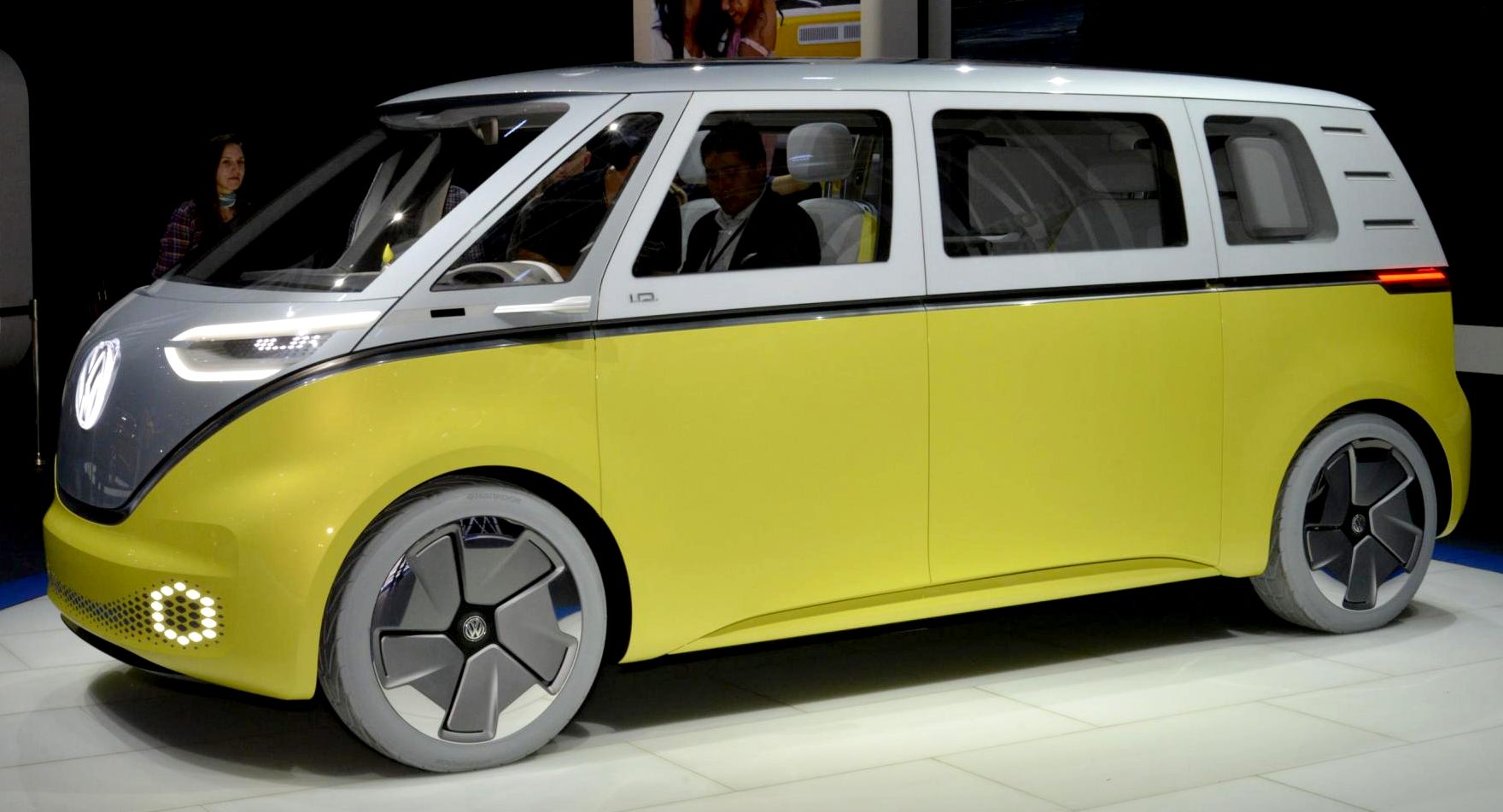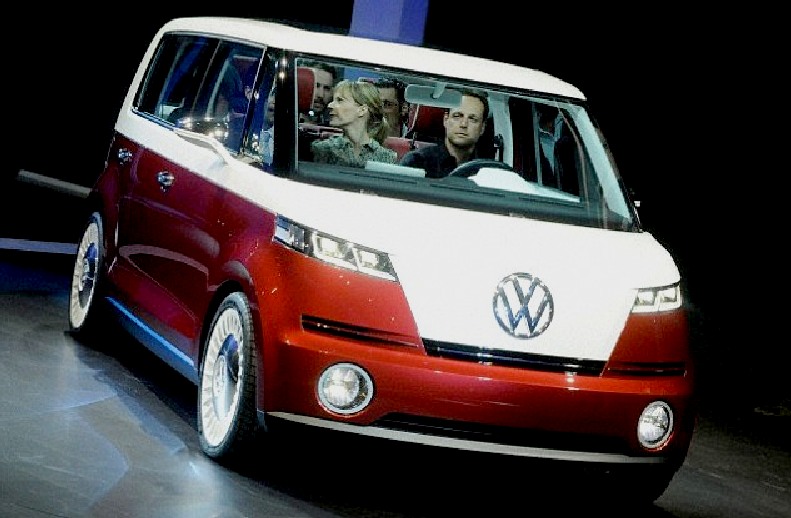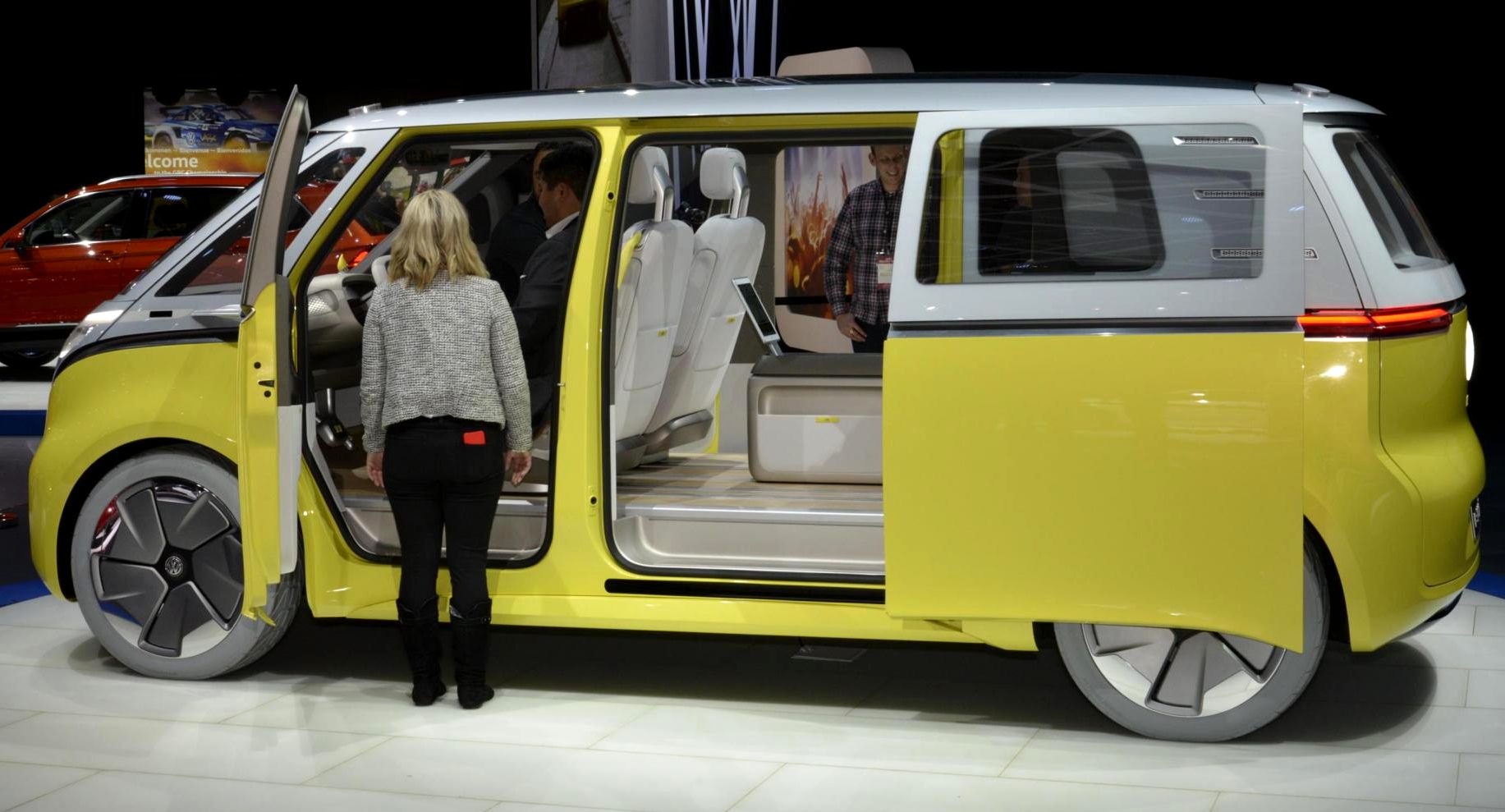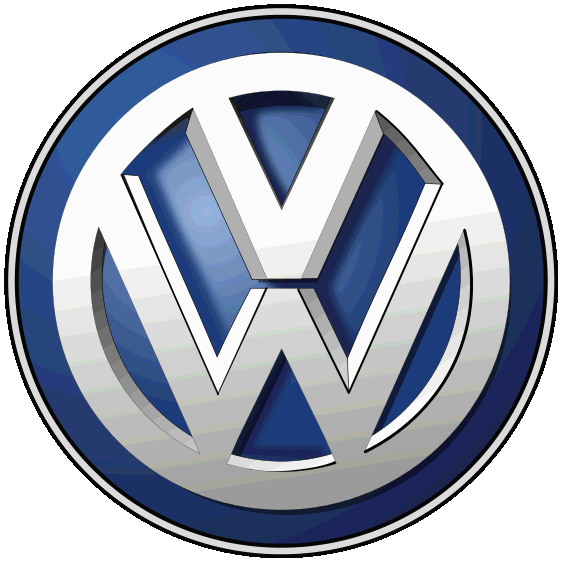|

TOP
GEAR VW I.D. BUZZ 9 JAN 2017
Just make it already. Volkswagen has teased us with all manner of small minibus concepts that hark back to the 21-window Microbus, from Bulli to Budd-e, without committing to production on any of them.
So with the launch of the new I.D. Buzz, you can forgive us if our patience is wearing a little thin. There’s clearly a desire from up top at VW to make a car like this, after so many concepts. It would be nice if they just got on with it…
The Buzz has made its debut at the 2017 Detroit motor show, and it does so with all the modern-day concept car staples neatly ticked off.
Electric power? Yup, 369bhp of it, with a claimed 373-mile range figure, like most petrol cars.
Self-driving functions? Absolutely, with the front seats swivelling 180 degrees to face the rear passengers when ‘I.D. Pilot’ autonomous mode is engaged.
Connectivity? Lots of it, with the car recognising its users’ smart phones, to personalise their experience, and all of its key data displayed via an augmented reality display in the driver’s line of sight.
Both interior and exterior make unsubtle hat-tips to VW’s past, with the ability to either seat eight or sleep several inside, and an unmistakable two-tone colour scheme outside. It’s about the same size as a VW Touareg, making it larger than previous Microbus-inspired concepts.
The I.D. buzz has electric motors at both axles, making it four-wheel drive, with 0-60mph arriving in around five seconds and its top speed limited to 99mph, to preserve battery life. The batteries are mounted nice and low to help both handling and interior space. A less powerful rear-driven version is a possibility.
The Buzz – the name refers to both the noise of an electric car, and the ‘bus’ of the Microbus name (seriously) – is the second Volkswagen I.D. concept we’ve seen, as the company’s electric car push continues and the virtues of its new scalable MEB electric car platform are revealed.
We’ll see the first car from the MEB system in 2020 – a production version of the first I.D., we suspect – with VW hoping to sell one million electric cars a year by 2025. By that point autonomous driving ought to be a reality, though perhaps not to the point the Buzz’s driver could swing round to face their passengers and take their eyes completely off the road.
That is, of course, if the Buzz gets built. VW has teased us for rather too long with appealing, not-too-retro nods to arguably its most iconic vehicle. Surely, with the relevance of all its technology, this is the one that finally makes it to production?

CONCEPT
- A previous attempt to put a modern camper on the road.
DAILY
MAIL 16 APRIL 2015 - BACK TO THE FUTURE
The Volkswagen Westfalia Camper is associated with the Seventies, the Summer of Love and nature-loving hippies.
Now the iconic van is about to get greener because the bus is being reborn as an electric vehicle, a Volkswagen board member revealed.
No images of the new vehicle have yet been released, but Dr Heinz-Jakob Neusser suggested that battery packs would be hidden under the vehicle's floor and a small electric motor will drive its front wheels.
The Volkswagen Westfalia Camper ceased production in 2003, and while VW has rolled out two concept 'microbuses' in recent years, neither have the charm or iconic good looks of its original.
Speaking at the New York International Auto Show, Dr Neusser didn’t give any specific design details away, but said that the new version will share some features with the Westfalia Camper, because the placement of the motor and batteries will allow designers to borrow aspects of the original 1950s design.
'It’s easy to bring battery space into such a vehicle, because you can put them under the floor. We have these systems already,' he told AutoExpress.
By eliminating the need for a conventional petrol engine, VW's designers could position the cabin further forward, to mimic the layout of the original.
Engineers are currently working on the concept car and Dr Neusser said that the design will go into production if it’s financially viable.
It's expected that the concept will be revealed in two to five years time.
The German automaker resurrected its beloved Beetle in 1997, after various iterations of the model were made for over six decades, between 1938 and 2003, suggesting it may repeat this success story with the VW Camper.
It unveiled four new concepts for its Beetle car, including two coupés and two cabriolets.
One of them is the Beetle Cabriolet Denim, which comes in ‘stonewashed blue metallic’ with a denim-like texture on the soft roof, while the orange Beetle Wave features fabric patterns from the 1950s and 60s as well as a wooden dashboard, which the company says ‘reflects the American spirit on the East and West coast beaches of the USA’.
The Beetle Pink Edition is simply pink, but the R-Line Concept is a sporty version with a 2.0 TSI engine, wrap-around body panelling, a black diffuser and large rear spoiler.

THE
SUN - VANTASTIC COMEBACK 28 FEBRUARY
2017
The iconic
VW Camper Van has had a cool makeover, with the latest version able to completely drive itself.
Volkswagen unveiled its new electric-powered eight-seater model, dubbed the I.D Buzz, which will go on sale in 2022.
The retro motor is an updated version of the much-loved VW Microbus, made between the 1950s and 1970s.
Designed by former VW chief executive Heinz Nordhoff, the first ever VW van was launched at the Geneva Motor Show in November 1949.
For the next four decades, the basic design remained the same, with around five million buses being produced over that time.
The original VW Camper was particularly popular during the counterculture movement of the 1960s and earned the nickname ‘Hippie van’.
Volkswagen’s new model will be revealed for the first time at the Detroit Motor Show this week, with the German manufacturers hailing the van “a new epoch of mobility”.
This is the second model from the upcoming Volkswagen I.D. range, which the brand hopes will go some way to repairing its damaged reputation in the wake of the ‘dieselgate’ scandal.
The company claims the van “forges links between the legendary origins of the Volkswagen brand and its electrifying future”.
It retains the VW Camper’s box shape, sliding doors and two-tone paint design, with an added glowing band of LED lights to separate the colours, a cool back-lit VW logo and huge 22-inch alloy wheels.
The I.D. Buzz boasts two electric motors, producing an incredible 369bhp – around the same as a Ford Focus RS Mountune or a Jaguar F-Type coupe.
This is compared to the 50bhp sported by its 1960s predecessor.
It goes from zero to 62mph in less than five seconds and has a top speed of 99mph.
The motor also has a self-drive feature for when the driver wants to take a break, with front-seat passengers having the option to swivel 180 degrees and face the opposite direction.
A statement from Volkswagen reads: “While the driver relaxes, laser scanners, ultrasonic and radar sensors and cameras monitor other road users and the surroundings.”
When not in use, the steering wheel sinks into the dashboard and becomes a touch screen.
The eight-seat interior can also be transformed into a comfortable dining-room layout with extendable table at the press of a button.
The seats can be folded and flattened to allow passengers to relax.

LINKS
& REFERENCE
http://www.dailymail.co.uk/sciencetech/article-3041993/Back-future-Volkswagen-Camper-set-comeback-time-s-ELECTRIC.html
http://www.huffingtonpost.co.uk/entry/the-vw-camper-van-is-back-and-its-electric_uk_58765280e4b087dc83e7f6c4
http://www.mirror.co.uk/tech/vw-camper-van-back-volkswagen-9590445
https://www.topgear.com/car-news/detroit-motor-show/vws-id-buzz-electric-autonomous-microbus
|



